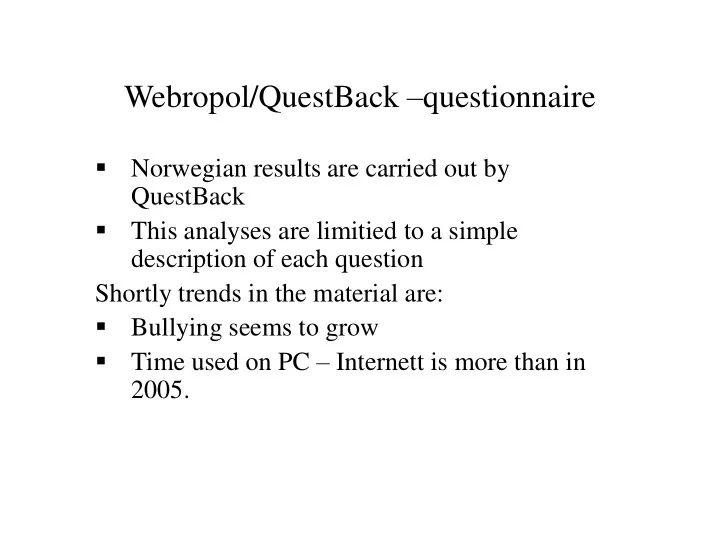

Webropol/QuestBack – questionnaire Norwegian results are carried out by QuestBack This analyses are limitied to a simple description of each question Shortly trends in the material are: Bullying seems to grow Time used on PC – Internett is more than in 2005.
Webropol/QuestBack – questionnaire How to use the results of the questionnaire?: • Make more comprehensive analysis of the national materiale; – Cross tabulation – Factor analysis – Path analysis – Carry out signficant calculations
Webropol/QuestBack – questionnaire How to use the results of the questionnaire?: • Compare results cross border • What kind of trends are there in the material in different countries? • What are similarities and differences? • Compare results with national and international reference material and publications • What conclusions are possible to make?
Webropol/QuestBack – questionnaire How to use the results of the questionnaire?: • Present the results in pilot schools • The materials are suitable to start discussions on: – Class level – School level – Home – school cooperation – Municipality level
Webropol/QuestBack – questionnaire • The results are in this sense a contribution to empowering the pilot schools, municipalities etc …. • This form of feedback to the schools attend the idea og local actors as co - researchers and the idea og action research
Webropol/QuestBack – questionnaire NB: the reporting is not complete without analyses of interviewes made with parents, teachers, experts etc … In Norway this work have started , but not finished.
Plan for Activitys, spring 2013, Norway Common Conference in Lulea February 6. – 7. Project partners discuss and confirm the state of the project and discuss analyzing of questionnaire and interweaves. Discuss publishing and further plans.
Plan for Activitys, spring 2013, Norway • Present results from the questionnaire in the pilot schools • Participate in conferences with the teachers and in meetings with parents • Evaluate; – New knowledge – New proficiency – New attitudes • Consequences for the school practices.
Plan for Activitys, spring 2013, Norway • Continue analysis of data • Prepare reporting of the project on web-sites and paper editions The questions are; • How to use the results as a guide for healtepromotion; – Psychosocial well-beeing – Physical activity – Time on Internett etc …..
Plan for Activitys, spring 2013, Norway Some observations indicates that it seems to be a triangle between: • Many hours on Internet • Bad nutrition • Lack of physical activity
Plan for Activitys, spring 2013, Norway • At the moment we do not know whether or not this statement will be confirmed in our material, but if so it might have conequnceses for; – Physical health – Psychosocial well-beeing – School work etc ….
Plan for Activitys, spring 2013, Norway According to the common project plan is Finnmark University College responsible for preparing a common workshop with the theme: «Challenges to use social media in health promotion».(item 4.2 in the Application) This work will start in the spring 2013.
Plan for Activitys, autumn 2013, Norway • Follow up analyses of the data • Follow up presentations in the pilot schools • Work on publications • Peer referee on texts and manuscripts • Plan for the common workshop in ACInNet : – «Challenges to use social media in health promotion». Which will take place in Alta.
Recommend
More recommend